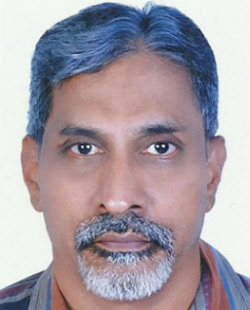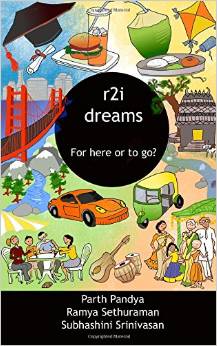An interview with P.R. Viswanathan.
You have been writing for Spark from when it was barely three months old. Now that we have completed five years, how would you describe your journey with Spark?
I started writing sometime in June 2009, publishing on my blog and circulating it among a few friends. Then I learnt of Spark from my friend, Bala Iyer, in February 2010; the timing was just perfect. I think in the first year or rather first 14 months, I wrote for all but two issues. Besides publishing my writings, Spark gave me the feel of belonging to a literary club. There were people writing on different subjects. Another great pleasure was to find my writings and those of others embellished by photographs and sketches. The editors gave their best in terms of production values; they turned out a classy-looking magazine every month. Unfortunately, I have been out of touch after 2012. I now run a forum which is concerned with basic civic issues confronting us in Panvel. Moreover, though I still write, my writing has been almost exclusively dedicated to political issues. But Spark is a great idea and I do hope I will once again pull my weight for what it is worth.
How old were you when you realised that writing was something you were passionate about that you wanted to do it as often as you can?
Never thought about it really! Now that you ask, it was surprisingly early. I remember writing some poems in school. It was in college though that I got a great deal of encouragement from my professors; I wrote for the college magazine and I also remember drafting a protest note to Pakistan for burning our passenger plane at Lahore airport; it had been hijacked en route from Jammu or Srinagar. We led a march of a few hundred students and handed the note over to the Consul of Pakistan in Bombay. Yes! I can say that certainly from age 20, I found the greatest joy and satisfaction in writing.
What are the themes that you like reading on? Could you share some books that you have really enjoyed and believe should be read by others too?
I think good writing, by which I mean anything written with feeling is a thing in itself and that, whatever the genre, has always appealed to me. Above everything else, for me, good writing is that which deals with human beings, their strengths, their foibles and all the weaknesses that flesh is heir to, with sympathy. Good writing is that in which one is able to relate to the characters, who are the subject matter of the writing. For this reason, I have found writers who may be considered poles apart and not normally mentioned in the same breath, equally interesting – for example, Shakespeare and Arthur Conan Doyle.
If I must choose in terms of theme, then I would without hesitation vote for biographies and books on India.
My recommended reading below, lists only the best of my favourite authors. I would urge those with interest to try and read all their other works as well:
1. Famous scenes from Shakespeare by Van H. Cartmell– but before this, it would be good to read the stories in Charles and Mary Lamb’s Tales of Shakespeare
2. The Moon and Sixpence and The Hour before Dawn – both by Somerset Maugham
3. The Memoirs of Sherlock Holmes
4. Courtroom by Quentin Reynolds
5. Gone with the Wind by Margaret Mitchell
6. Roots by Alex Haley
7. The Prophet by Khalil Gibran
8. De-colonising the Hindu Mind by Conrad Elst
9. The Vedas (words of Paramacharya of Kanchi) published by Bharatiya Vidya Bhavan
10. Roses in December by M C Chagla
11. Ramayana and Mahabharata – both by C. Rajagopalachari
We have seen that you are very passionate about writing on India and its issues. What do you think are concerns that need to be addressed immediately? How are you leveraging your writing skills to this end?
No country has received so many raw deals as India and no civilization has been so often and so badly wounded as ours over the 1000 years of the second millennium. What we suffered at the hands of the invaders is relatively better known. The more sinister and subtle attack on us, on our minds, came from English education and the distorted version of our history written by the colonialists and their Indian lackeys-in-spirit and taught in our schools. The impact has been so great that it will continue to be felt for some more time. Fortunately though, we are showing signs of emerging from the rut – ever so slowly. “De-colonising the Hindu Mind” by Conrad Elst is a very useful read to understand this phenomenon. Even more important are the five volumes on various aspects of India circa 1800 written by Dharampal. These writings of Dharampal are based entirely on British documents, mainly reports written by officers of the East India Company to the King of Britain. The early reports are full of praise for most things Indian particularly in regard to the following:
o Science: we had an effective vaccine for small pox, we had an observatory and were highly advanced in astronomy
o Agriculture: our yields were the best in the world
o Governing and judicial institutions: the Panchayat system
o Revenue collection and sharing: India had a very fair system; the collection from the farmer depended on the crops in the year and the sharing was largely in favour of the collecting villages with only a small part (20-25%) going to the central treasury.
In later years, with several conquests under their belt, the tone of the British reports changed. They became all about belittling and oppressing Indians. More than that, by various acts, the British destroyed much of our progress. Their master stroke was the new revenue collection system. Instead of the crop yield, the land owned became the basis for the tax so regardless of the state of the crops the farmer had to pay a fixed sum based on the land he owned. The sharing of revenues was reversed with the government getting the bulk (about 80%) and the collecting villages getting just 20%. Thus the people were impoverished and villages were starved of funds. Worse still, the British then proceeded to tell or rather teach us that this is how we always were – poor, incapable and disease ridden. Macaulay’s minute to the British Parliament, the basis for imposition of English education and the culmination of this process was the second master stroke by which the British managed to colonise our minds.
So, talking of immediate concerns, nothing is more important than de-colonising our minds and reviving our self-confidence by giving wide publicity to our achievements and capabilities with facts, figures and reason. As far as leveraging my writing skills is concerned, I now concentrate my writing efforts mainly on this subject. My blog is at present my main avenue. I am connected with a few friends and family members. Even the best of writers with access to a newspaper column can do only a little. So I try not to think in terms of reaching out more, having a greater impact and so forth. Just persist with what little I am doing.
When writers write stories set in Bombay, the story usually reaches a new level in terms of literary experience. You have written quite a few Bombay-based stories too. What about the city fascinates you?
I was born and bred in Bombay and grew up with two strong beliefs. One of them is in the legend that this city was blessed by Goddess Mahalakshmi to whom the kolis gave refuge; thanks to the Goddess, no man who lives in this city goes home empty-handed. I have seen the transformation of a procession of Tamilians from Tirunelveli who took refuge in my childhood home. They had very little education and were without exception ignorant of any language except Tamil. But in a few months, they acquired a smattering of Bambaiya Hindi and could make their way about in the city. The city simply energises you. The other belief is in the average Maharahstrians as the most decent, honest and straightforward of Indians. Have you ever wondered why Mumbai’s crime rate is so low relative to its population density?
What is unique about Bombay or Mumbai? Can’t really put my finger on any one characteristic! The city has a host of outstanding features. For one, it lets you be. The Gujaratis live in Ghatkopar and Vile Parle, the Maharashtrians in Dadar and Girgaum, Matunga was at one time a Tamil island and so forth – each community living life in these enclaves the way they did back home in their part of the country with their own temples, schools and dress styles intact. And yet, together they somehow welded into a unity. They all had a shared ethos which said many things like:”Never say die”, “the show must go on” “we will manage” and “chalta hai”. The city appreciates hard work and does not grudge an Ambani his riches but is also a great leveler. God save Ambani if he should find himself in Churchgate station during rush hour.
What do you believe is the purpose of your writing?
Basically it is self-expression; it is very much like a painter wanting to paint. At least that is the only way I can write – about something deeply felt, passionately believed in. In fact I believe that if my writing at all appeals to anyone, it is due to this. And I can tell you this: “India Timeless Kaleidoscope”, a couple of other pieces on India, the stories of Times Krishnan (“Train to Madras”) and my driver (“Hamid Sarathy”) all of which you were good enough to publish in Spark, all these I have written with total involvement often with tears in my eyes.
One other purpose is to analyse issues clearly, going straight to the heart of the matter, add perspective and set it all down on paper in a clear, logical and forceful manner.
Lastly, please share a few words that summarise what you truly believe in and stand for.
Human beings are at the centre of the universe and all things we do in life should express our affection for them.
Questions by Anupama Krishnakumar






